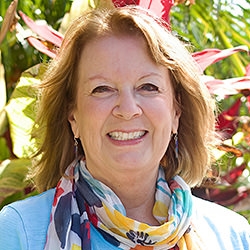

Search Results: trainer
-
Ask the Trainer: Can all needs be met when illness limits the capacity of one person to meet the needs of her partner?
-
Ask the Trainer: How do I respond to people who believe that consequences are necessary to change behavior?
-
Ask the Trainer: Is it a good idea to use NVC on persistent guilt, anger or depression without the aid of others?
-
Trainer Tip: Tap into feelings, needs and requests for greater self connection with the six steps in this worksheet.
-
Join Mary Mackenzie, Certified NVC trainer, as she offers ways to incorporate NVC empathy guesses, feelings and needs into everyday conversations. This approach is geared towards adding deeper connection to the natural flow of conversations. The technique has become known as Street Giraffe.
-
October always makes me think about Marshall Rosenberg, the founder of Nonviolent Communication. He was born October 6, 1934. If he were still alive today (he died February 7, 2015), he would be 89 years old!
-
- Hear from four respected NVC trainers offering heartfelt insights and real-life strategies
- Connect with others seeking compassion, courage, and meaningful action
- Attend as a gift — pay what you can to support NVC Academy
- Discover simple, practical tools to stay grounded, clear, and empowered—no matter what’s happening in the world!
-
Ask the Trainer: "Fairness" isn't on the needs list. What needs might be underneath it?
-
Ask the Trainer: Feeling frustrated & angry over simple things? Find the root of your hidden needs.
-
Ask the Trainer: Exploring how unconscious motivations influence the needs we identify and express.
-
Exploring ways to stay compassionate and connected when someone seems angry or controlling.
-
Ask the Trainer: Get guidance on working with enemy images and exercises that bring relief.
-
Ask the Trainer: Get ideas to help your girlfriend accept you aren't responsible for her feelings.
-
Fear in dealing with a neighbor's 'wastebasket talk.' Only leaving or interrupting stops the flow.
-
There are endless ways to meet our needs. Conflict occurs when we argue over strategies. When we actively value everyone’s needs, we foster openness and deeper connection in our relationships. Today look for opportunities to focus on needs in order to resolve an issue with at least one person.
-
Instead of wondering, invest time today to ask at least one friend your friendship enhances her life. Such clarification can deepen the connection.
-
Ask the Trainer: “I would like some suggestions on how to interact with a member of the practice group I started. This individual speaks and acts in a manner I interpret as angry and controlling.”
-
Exploring how to connect with your reasons for offering empathy when someone shares pain.
-
Ask the Trainer: The link between storytelling, being "right," and connecting to an unmet need.
-
Ask the Trainer: Can NVC transform group conflict? Trainer shares stories and answers the question.
Quick Links

Stay in Touch!
We value your privacy, won't share your email address and you can easily unsubscribe any time.

















